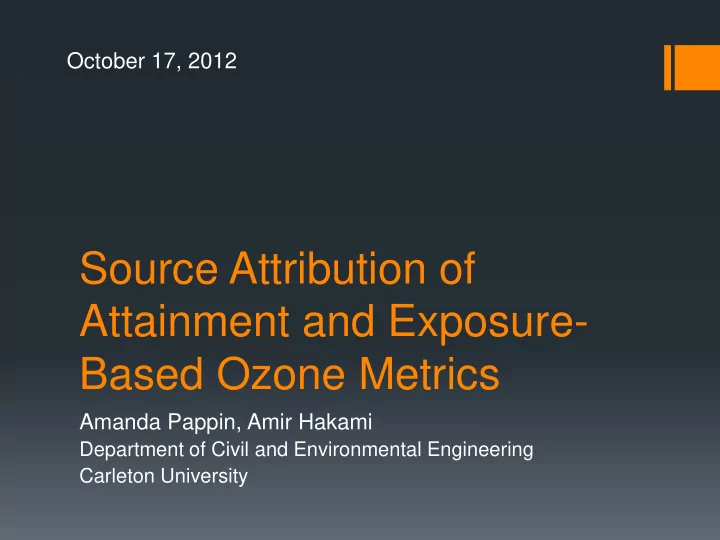

October 17, 2012 Source Attribution of Attainment and Exposure- Based Ozone Metrics Amanda Pappin, Amir Hakami Department of Civil and Environmental Engineering Carleton University
Outline regulatory standards sensitivity methods adjoint response of policy metrics: attainment exposure
Ozone Standards threshold-based standards are devised to protect public health design value = fourth-highest concentration measured in a year, averaged over 3 years, not to exceed 75 ppb (65 in Canada) daily maximum 8-hr average
Attainment all locations have equal weighting versus Exposure Metrics locations are weighted by population e.g . mortality, health “damages”
…and thus different responses to emission controls
An ideal regulatory approach would differentiate between source impacts preferential targeting of the most “damaging” emissions
Adjoint Sensitivity Analysis where influences come from 𝜖𝐾 𝜖𝑦 𝑗 𝑦 𝐾(𝑧) INPUTS/ OUTPUTS/ SOURCES RECEPTORS
Adjoint Cost Functions “probabilistic” attainment metric 1. 2. exposure metric
Possible Cost Functions 4th-highest simulated concentration probability of non-attainment probability-weighted concentrations
Adjoint Cost Function (1) Attainment average design value (C 4-highest > 65 ppb) in Canada & U.S. 92 𝐾 = 1 1 𝑄 𝑄 𝑢 𝐷 𝑢 𝑂 𝑗,𝑘 𝑗,𝑘 𝑢=1 C t = simulated max 8-hr avg ozone concentration for day “t” 𝑄 𝑢 = probability that 𝐷 𝑢 is among the fourth-highest simulated concentrations 92 𝑄 = 𝑄 𝑢 𝑢=1
Adjoint Cost Function (1) Attainment average design value (C 4-highest > 65 ppb) in Canada & U.S. 92 𝐾 = 1 1 𝑄 𝑄 𝑢 𝐷 𝑢 𝑂 𝑗,𝑘 𝑗,𝑘 𝑢=1
Adjoint Cost Function (2) Exposure short-term mortality in Canada & U.S. 𝐾 = 𝑁 0 ∙ 𝑄𝑝𝑞 ∙ 𝑓 𝛾∙𝐷 𝑗,𝑘 𝑁 0 = non-accidental mortality rate 𝑄𝑝𝑞 = population 𝛾 = pollutant response coefficient, 0.0427% per ppb 𝐷 = max 8-hr avg ozone concentration
Adjoint Cost Function (2) Exposure short-term mortality in Canada & U.S. 𝐾 = 𝑁 0 ∙ 𝑄𝑝𝑞 ∙ 𝑓 𝛾∙𝐷 𝑗,𝑘
Case Study Gas-phase CMAQ adjoint (4.5.1) North American domain 36 km resolution 34 vertical layers July-Sept 2007
Results
10% NO x reduction → O 3 design value Attainment
10% NO x reduction → O 3 mortality Exposure
Attainment vs. Exposure 10% NO x reduction → O 3 design value 10% NO x reduction → O 3 mortality
0.7 ppb reduction in design value 0.6 0.5 0.4 0.3 0.2 0.1 0.0 -40 -30 -20 -10 0 10 20 -0.1 avoided deaths/yr
0.06 1.2 Exposure ppb reduction in design value Attainment 0.05 1.0 avoided deaths/day 0.04 0.8 0.03 0.6 0.02 0.4 0.01 0.2 0.00 0.0 01-Jul-07 16-Jul-07 31-Jul-07 15-Aug-07 30-Aug-07 15-Sep-07 Atlanta Time-Series
Combined response of attainment and exposure metrics Is there a way to directly account for population exposure in regulation?
Interested in CMAQ-adjoint? Thank you.
Back-up Slides
Adjoint Cost Functions Attainment 3 𝑄 𝑗 = 𝑜 𝑘 ∙ 𝑄(𝐷 ≤ 𝐷 𝑃 3 ,𝑗 ) 𝑜−𝑘 ∙ 𝑄(𝐷 ≥ 𝐷 𝑃 3 ,𝑗 ) 𝑘 𝑘=0
0.10 0.05 0.00 avoided deaths/day -0.05 -0.10 -0.15 New York NOx Los Angeles NOx -0.20 Atlanta NOx Hamilton NOx -0.25 01-Jul-07 16-Jul-07 31-Jul-07 15-Aug-07 30-Aug-07 15-Sep-07 Exposure
2.5E-02 New York NOx Los Angeles NOx ppb reduction in design value 2.0E-02 Atlanta NOx Hamilton NOx 1.5E-02 1.0E-02 5.0E-03 0.0E+00 -5.0E-03 01-Jul-07 16-Jul-07 31-Jul-07 15-Aug-07 30-Aug-07 15-Sep-07 Attainment
0.04 0.025 Exposure 0.02 ppb reduction in design value Attainment 0.020 0.00 avoided deaths/day -0.02 0.015 -0.04 0.010 -0.06 -0.08 0.005 -0.10 -0.12 0.000 01-Jul-07 16-Jul-07 31-Jul-07 15-Aug-07 30-Aug-07 15-Sep-07 LA Time-Series
Recommend
More recommend